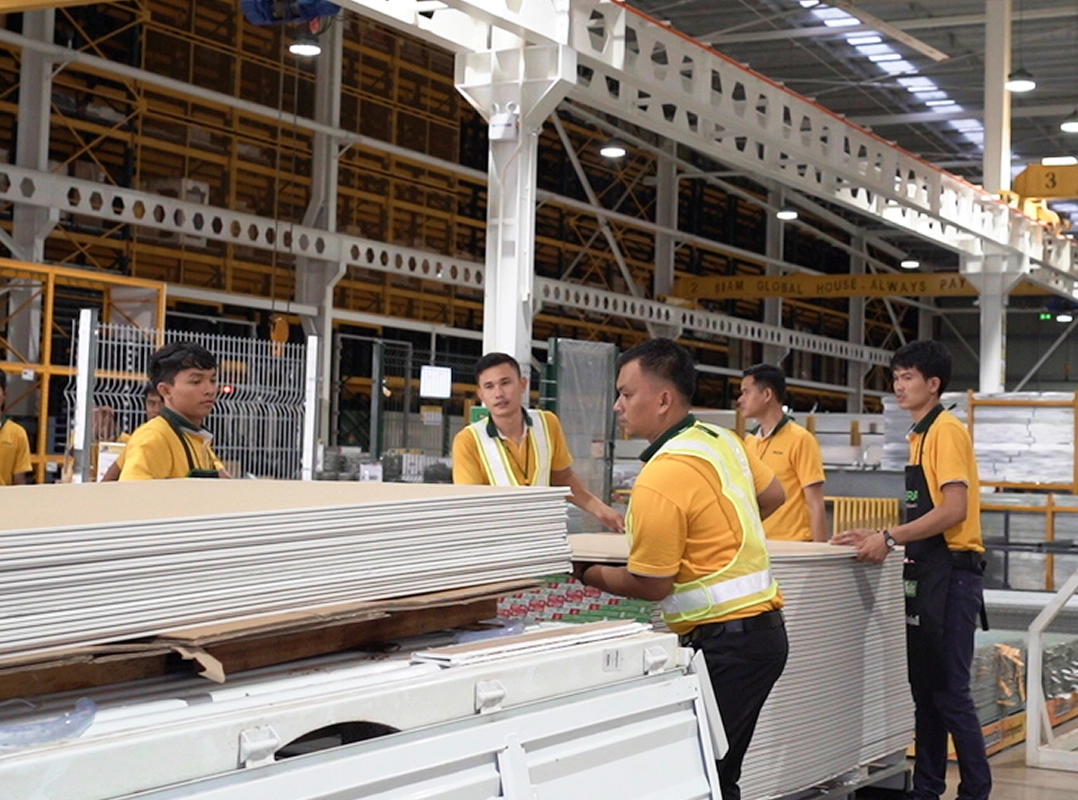
Human Rights
Supporting the SDGs Goals
SDGs
Goal 5:
Goal 16:
Goal and Performance Highlights
Key Operations in 2024
- The Company conducted screening and auditing suppliers for human rights compliance to ensure fair operations and the non-violation of human rights towards the employees and workers of the suppliers. Additionally, a Supplier Code of Conduct was created to inform suppliers.
- Human rights training was provided for employees at all levels to ensure understanding and participation in preventing human rights violations in all Company activities.
Key Performance in 2024
- The Company committed non-discrimination and provided equal employment opportunities without discrimination based on physical differences, age, gender, race, nationality, disability, religion, social status, gender identity, or sexual orientation. Additionally, the Company promoted and supported the employment of 107 disabled individuals.
- 100.00% of employees at all levels have received training on human rights.
- There were no cases or complaints of human rights violations, including issues related to human trafficking, forced labor, child labor, discrimination and all forms of sexual harassment or abuse, as well as freedom of association.

Management Approach and Value Creation
Management Approach
The company has established the human rights policy in corporate governance manual and business ethics which are comprise of practices toward stakeholders both internal and external. By having all directors, executives and employees to adhere the practices to ensure that the business operation shall proceed with prudence, without any acts causing human right infringement either directly or indirectly. The company has publicized the mentioned policy through the company’s website, internal communication channel “Share Point” and employee training to be acknowledged and followed.
Human Rights Policy

Gender Diversity
| Gender | Number (person) | % |
|---|---|---|
| Male | 6,579 | 57.04 |
| Female | 4,955 | 42.96 |

Age Diversity
| Age | Number (person) | % |
|---|---|---|
| Younger than 30 year | 4,673 | 40.52 |
| Between 30-50 year | 6,139 | 53.22 |
| Older than 50 year | 722 | 6.26 |
Nationality Diversity
| Nationality | Total Employees (%) | All management positions (%) |
|---|---|---|
| Cambodia | 0.010 | 0.00 |
| Philippines | 0.00 | 0.00 |
| China | 0.00 | 0.00 |
Ethnic Diversity
| Ethnic Group | Number (person) |
|---|---|
| Tai Yai | 75 |
| Tai Lue | 1 |
| White Pga K'nyau | 22 |
| Red Pga K'nyau | 13 |
| Lahu | 5 |
| Black Lahu | 1 |
| Akha | 4 |
Religious Diversity
| Nationality | Number (person) | % |
|---|---|---|
| Buddhist | 11,115 | 96.37 |
| Christ | 18 | 0.15 |
| Islam | 400 | 3.47 |
| Other | 1 | 0.010 |
| Share of Female Employees | Performance for 2024 (%) | Target 2025 (%) |
|---|---|---|
| Female employees per total number of employees | 42.96 | 50 |
| Female Executives in operation per total executive | 39.99 | 40 |
| Female Executives in middle level per total executives | 39.62 | 45 |
| Female Executives in revenue-generating functions | 35.13 | 40 |
| Female Executives in total executives’ level | 33.33 | 40 |

Gender Pay Gap Analysis
| Indicator | Difference between men and women employees (%) |
|---|---|
| Mean gender pay gap | 14.87 |
| Median gender pay gap | 4.97 |
| Mean bonus gap | 8.25 |
| Median bonus gap | 25.54 |
| Employee level | Average Women Salary | Average Men Salary |
|---|---|---|
| Executive level (base salary only) | 2.24 | 1 |
| Executive level (base salary + other cash incentives) | 2.93 | 1 |
| Management level (base salary only) | 1.40 | 1 |
| Management level (base salary + other cash incentives) | 1.52 | 1 |
| Non-management level (base salary only) | 1.21 | 1 |

Determination
- Human Rights Policy
Assessment
- Identifying the scope of Human Rights issues
- Assessment of the risk level
- Prioritization of human rights issues
Integration
- Human Rights Risk Assessment
- Human Rights Impact Assessment
Tracking and Reporting
- Improve management plans to deal with impacts and take corrective action efficiently
- Monitor and evaluate mitigation measures
- Disclose human rights performance to public annually
Mitigation and Remediation
- Remedies for those affected in case of human rights infringement
- Establish the department through a complaint’s mechanism
Human Rights Impact Assessment
Assessment of Actual and Potential Human Rights Impacts of Company Activities and Relationship
The Company performs assessment to identify the Human Rights risks issues in business operations and related persons that may get impacts from human right violation. Including Human Right Risk Assessment and Human Right Impact Assessment: HRIA.
Human Rights risk assessment covers only for the business activities of the Company as follows: Product Operations, Service Operations, Product Distribution Operations, Store and Office Operations. And considering all stakeholders both internal and external that may get impacts directly or indirectly from the business activities of the Company throughout the value chain such as employees, customers, suppliers, shareholders, and communities, etc.
Scoping the human rights issues
Labor Rights
- Employment Conditions
- Working Environment
- Occupational health and safety
- Non-discrimination
- Freedom of association and collection bargaining
- Forced Labor
- Data Privacy of Employees
Community and Environmental
- Standard of living and quality of life
- Community Safety
- Access to water sources
- Acquisition of Land
Consumer Rights
- Consumer health and safety
- Data Privacy of Customer
- Customer Non-Discrimination
Risk Assessment
The Company conducts human rights risk assessment by using 5x5 risk matrix to identify risk level of human rights issue, considering from 2 dimensions, that is; severity and likelihood, and divided risk of human rights issue into 4 levels as follows;
Prioritization of Human right issues
The Company set the priority of the important human rights risks, which are the most severely impacted through related activities and other business relationships of the Company. In 2024, the Company has the important human rights risks 6 issues as a result from the risk assessment of business activities.
Preventive Measure and impact reduction on human right of high-risk issues
| High Risk Issues | Preventive Measure and Impact Reduction | Integration and implement |
|---|---|---|
| Privacy of Customer Information |
|
|
| Privacy of Employee Information |
|
|
| Privacy of Supplier Information |
|
|
| Occupational Health and Safety of Employees |
|
|
| Community Health and Safety |
|
|
| Consumer Health and Safety |
|
|

Performance of the year 2024
The company conduct the Human Right Risk Assessment and Human Right Impact Assessment covering business operation and activities These assessments include measures to reduce impacts and identify solutions for high-risk issues. In 2024, the company reported no cases of human rights violations, including forced labor, child labor, discrimination or sexual harassment, freedom of association, collective bargaining, equal remuneration, or any other human rights issues

Freedom of Association
The company promotes and provides freedom of expression and integration for employees, as well as processes and channels for listening to opinions and concerns through various channels such as the Voice of Employee program, the call center system, and the complaint center. These channels cover various fields, including suggestions and opinions shared through the Welfare Committee, which is considered an important mechanism for employee participation.
The company has promoted the participation of employees in collective action and has the power to collectively bargain on various related issues. A welfare committee has been established to represent employees in consultations, recommend, inspect, and supervise welfare arrangements, including managing suggestions and issues related to welfare and the working environment.
The welfare committee will be nominated and selected by electing employees in each branch area, covering 100% of the staff, to act as employee representatives. The elected welfare directors will hold office for a term of 2 years and will hold meetings with branch executives and the company at least once a quarter in accordance with the Labor Protection Act B.E. 2541.
Currently, the company’s welfare committee covers all branch areas, comprising a total of 91 committees and 598 members. By implementing guidelines to improve issues related to welfare and the working environment, aiming to support well-being and enhance the quality of life at work for all employees in a fair and equal manner.
In 2024, there were approved suggestion issues for additional actions as follows:

Fair Labor Practice
The company is committed to ensuring that employees can maintain a balance between work and personal life, in accordance with their varying needs. As a result, the company has implemented flexible working arrangements to allow employees to adjust their work schedules to align with their personal needs. Employees can choose their working hours based on the company's designated time slots and can make changes to their working hours every 15 days. The working hours are divided into six time slots as follows: 07:30 AM – 04:30 PM, 08:30 AM – 05:30 PM, 08:00 AM – 05:00 PM, 10:00 AM – 07:00 PM and 11:00 AM – 08:00 PM
Furthermore, the company is committed to respecting the labor rights of employees and ensuring fair treatment in accordance with relevant policies and laws, under Thai Labor Protection Act. This includes employment contracts, wages, working hours, holidays, benefits, and maintaining a safe workplace with a good working environment. the Company provides the following welfares.
| Welfare | Legal Entitlements | Welfare provided by the Company |
|---|---|---|
| Maternity Leave | 98 days | 98 days |
| Holidays | No fewer than 13 days | 14 days |
| Annual Leaves | No fewer than 6 days | 6–15 days |
| Personal Leaves | 3 days | 12 days |
Furthermore, the company has allocated a variety of welfare benefits to employees to enhance the overall well-being while working with the company. These include leave days for male employees to care for newborns, financial assistance programs, stress-relief areas, breastfeeding rooms, and various life stability benefits such as Provident funds, life insurance, and financial aid in case of emergencies.

